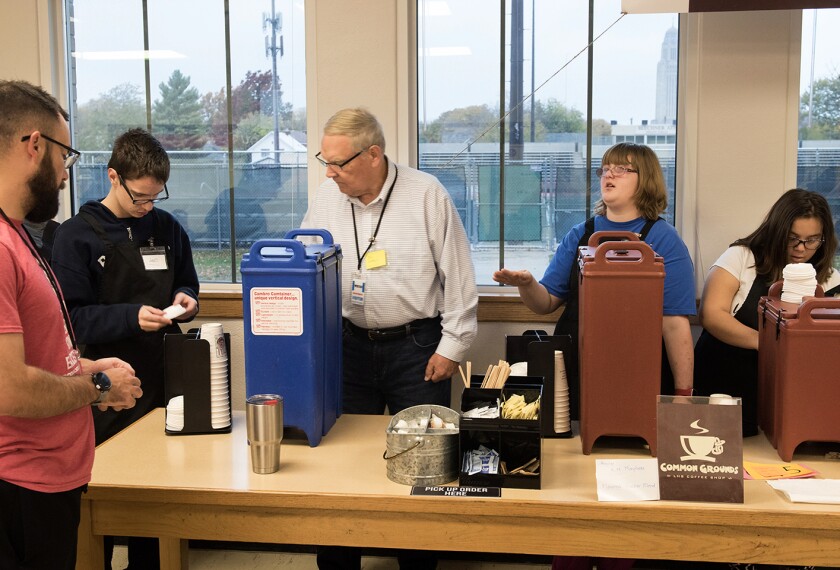Two years ago, peering down into the U.S. Capitol viewing gallery as members of Congress debated bills, Jonathan Kratchman, a high school student from Cherry Hill, N.J., decided he wanted to get a law degree. He wanted to go into politics.
For a young man who didn’t speak until age 3, Jonathan, now 18 and a senior, says deciding to go to college has helped him find his voice.
“It was a long shot. At my school, most students go to community college, if they go,” said Jonathan, who has autism. “They thought my mom and I had already decided I would stay in the system until I was 21.”
In fact, transition concerns led him to Washington in the first place as a sophomore. Jonathan attended a youth forum for students as part of a briefing by U.S. Rep. Chris Smith, R-N.J., an autism-awareness advocate, on the problem of students “aging out” of services at age 21 under the Individuals with Disabilities Education Act.
Jonathan recalled talking to lawmakers’ staffs about the challenges for students with autism in transitioning to higher education. He has a solid transcript—a 3.8 GPA at the Newgrange School, an out-of-district placement school in Hamilton, N.J., and plays guitar and bass for a band at the local chapter of the School of Rock—but had difficulty making the case to his parents and school for “the whole college experience,” living away from home, and taking challenging academic courses.
For example, when he was transferred midyear to Newgrange, he was automatically put into a remedial-reading program. He felt a disconnect, but wasn’t sure how to address it at his individualized education program, or IEP, meetings until the following year, when his reading teacher took him aside to say he didn’t belong in the class. Even then, Jonathan said he had to present evidence of his work to the IEP team to move to a different class.
Jonathan said his teachers and IEP team were surprised when he applied and was accepted to Rutgers University‘s support program for students on the autism spectrum.
“I was going to take advantage of IDEA and continue until I turned 21, but honestly, I thought being able to go on to college—even community college—was a long shot if I stayed under IDEA [until 21], so I decided to give up my rights effective when I graduate” later this June, he said.
We take a look at how six students with disabilities are planning their transition to college and the workforce:
- Md. Senior Opts to Study With Other Hearing-Impaired Students
- After Eight Years at Lab School, Pa. Student Seeks Culinary Arts Career
- Ga. Student With Dyslexia Battles Her Way to College
- Special Ed. Student Aims for College, Political Career
- Va. Twin Brothers Find a Place in the Work World
Rutgers, in New Brunswick, N.J., will allow Jonathan to continue using a few of the accommodations he has in high school, but he said the most difficult support to find is the one he needs most: social supports to navigate the new world of college. Jonathan found 26 schools nationwide with formal social supports for students with autism, including Rutgers, which provides a peer mentor, sponsors social events, and connects students to peer tutoring.
Added Expenses
The supports will be a relief in one sense, and a stress in another. “They can only have 17 kids, and it’s an extra $7,000 a year on top of the already-staggering tuition,” he said. “I’m applying for scholarships, but there are so many other people applying for [them] I don’t think I’ll get anything.”
That leaves student loans, Jonathan said. While he may work part time during the summer, “I can’t work at the same time [as class] because it’s a bit too much for me.”
The cost and intensity of the program will make it both easier and more critical for Jonathan to get a competitive job after graduation, and he has already started building career experience. Last summer, Jonathan interned in Rep. Smith’s New Jersey office, answering the phone and handling electronic filing.
“The thing I like the most is also the thing I like the least, answering the phones,” he said. “You never know what you are going to get. You could get someone really nice and easy, and then you could get someone who is really giving me a hard time.”
Now, Jonathan attends classes part time and takes community college courses in criminal justice at home for dual credit. He said his school transition counselor has helped him learn to speak up for things he needs.
Yet he also wishes teachers had encouraged him and planned with him for college earlier.
“The schools should be more supportive in the process” of students with disabilities going on to college, Jonathan said. “I did it at the very last minute, applied at the last minute, took my ACT/SATs at the last minute,” he said. “I wasn’t sure how I’d be able to do in college, and we had no clue about some of these support programs.”






